Demolition Contractors Birmingham
Best Local Demolition Contractors in Birmingham
Receive multiple Demolition Experts quotes for your project today! Compare profiles, reviews, accreditations, portfolio, etc... and choose the best offer.

North Alabama Land Services
54 reviews11002 Vivian Drive NW, Huntsville, 35810, USNorth Alabama Land Services is here to help you! We are a family-owned and operated business with rock solid values that stand for honesty, integrity, and hard work. We know that your property is important to you, so it is important to us too. Therefore, we are not finished until you are satisfied. We look forward to meeting you, and getting to work on your next project. Please contact us to schedule your in person appointment for a free estimate. Your land, our expertise, endless possibilities. Unleash your land's potential with North Alabama Land Services.
- Services
- Why Us?
- Our Team
- Gallery
Get Quote
Borden Construction Contracting and Excavations
51 reviews328 James Frazier Road, Lacey's Spring, 35754, USAbout Borden Contracting Borden Contracting Company LLC has been serving all of North Alabama since 1982, providing services of demolition, clearing, drainage, underground utilities, streets, roads, building pads & parking lots. We are a family-owned and operated business with a commitment to providing our clients with the highest quality services at competitive prices. We are fully licensed and insured, and we have a team of experienced professionals who are dedicated to getting the job done right. We understand that every project is unique, and we work closely with our clients to ensure that their needs are met. We are committed to providing our clients with a positive experience from start to finish. We are proud to be a part of the North Alabama community, and we are committed to providing our clients with the best possible service.
- Services
- Why Us?
- Gallery
Get Quote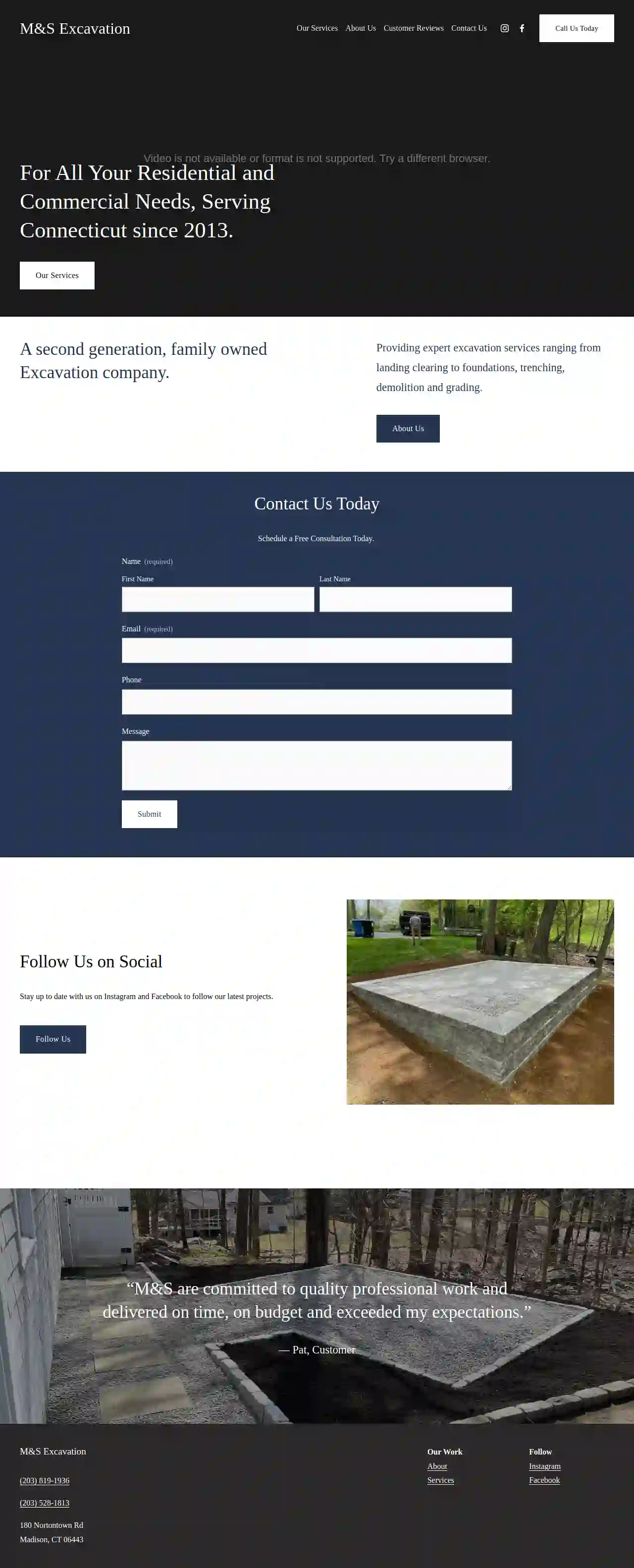
M & S Excavation & Septic LLC
514 reviews180 Nortontown Rd, Madison, 06443, USSecond Generation Family Owned Experts in Excavation M&S Excavation is a family-owned and operated excavation company serving Connecticut since 2013. We are committed to providing our customers, both residential and commercial, with excellent services at the fairest price possible. We stand behind our work and will not rest until our customer is 100% satisfied with the end result. We offer the highest quality services and expertise, combining generations of craftsmanship and experience on all types of projects. We work closely with customers as well as contractors. We offer a free consultation and estimate for all work and guarantee a price match on any competitive bid.
- Services
- Why Us?
- Testimonials
- Gallery
Get Quote
Roto-Rooter Plumbing and Water Cleanup
4.8Huntsville, USYour Local Roto-Rooter Plumber in Huntsville, AL Roto-Rooter delivers expert plumbing solutions in Huntsville, Alabama, that you can count on 24/7/365. Whether you’re struggling with sewer lines, water damage, or drain cleaning, our skilled plumbers are ready to tackle any plumbing challenge, large or small. Since 1935, Roto-Rooter has stood apart from the pack as Huntsville’s premier provider of drain cleaning and plumbing services. Our commitment to quality and customer satisfaction means that when you choose Roto-Rooter, you get: Same day service 24/7 availability Highly trained, experienced plumbers State-of-the-art diagnostics and equipment No hidden or extra charges for plumbing or drain service on holidays, nights, and weekends Free onsite and upfront estimates Fully licensed, insured, experienced plumbers Senior and military discounts Special financing options available Schedule your appointment with our Huntsville plumbing experts via our online form, or call our 24/7/365 service line at 256-533-7246. Comprehensive Plumbing Solutions in Huntsville, AL No matter what plumbing problem you’re facing, Roto-Rooter has the expertise and experience to get the job done right. We offer a wide range of plumbing services, including:
- Services
- Why Us?
- Testimonials
- Gallery
Get Quote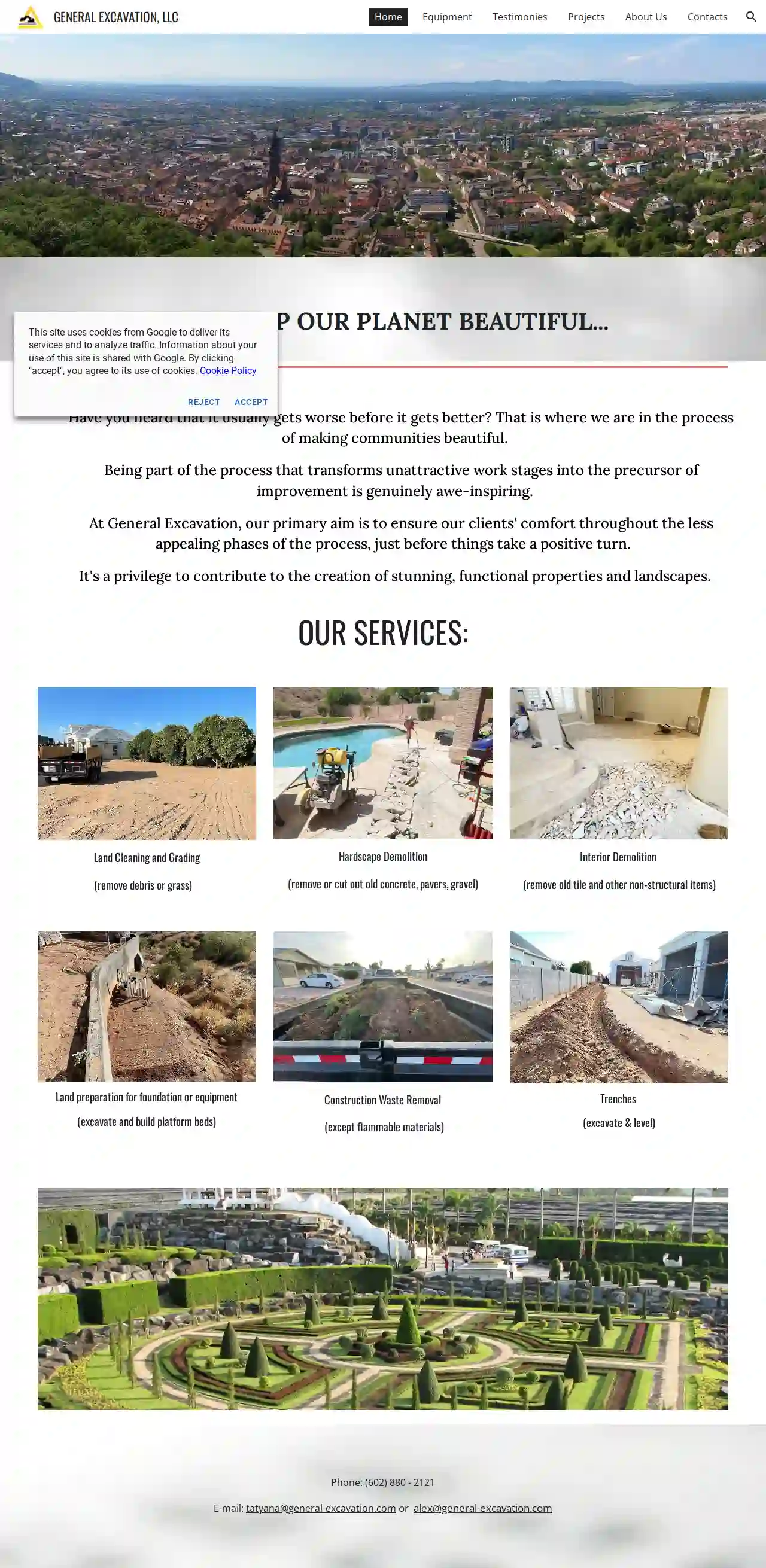
General Excavation, LLC
55 reviewsMadison, USGeneral Excavation: Transforming Landscapes, One Project at a Time General Excavation is a dedicated team committed to enhancing communities through meticulous landscaping and excavation services. We understand that the process of transforming a space can be challenging, and we strive to make it as smooth and comfortable as possible for our clients. Our passion lies in taking on the less appealing phases of a project, ensuring that the foundation for a stunning and functional outcome is laid with precision and care. We are proud to contribute to the creation of beautiful and practical properties and landscapes, leaving a lasting positive impact on the communities we serve.
- Services
- Why Us?
- Gallery
Get Quote
Rogers Group, Inc.
3.664 reviews421 Great Circle Road, Nashville, 37228, USBuilding Communities From the Ground Up Rogers Group Inc., headquartered in Nashville, TN, is the largest privately owned construction aggregate company in the country. For more than 115 years, our crushed stone and hot mix asphalt have laid the foundation for homes, schools, hospitals, highways, and other infrastructure critical to the American economy. American-Owned, Family-Led With over 3,000 skilled employees and more than 85 quarries and 55 asphalt plants, Rogers Group supports business operations in 10 states: Alabama, Arkansas, Indiana, Kentucky, Mississippi, North Carolina, Ohio, South Carolina, Tennessee, and Texas. Our Core Values Our company culture is informed and strengthened by our core values of placing the highest value on people, unwavering integrity, and excellence in every undertaking. Our success hinges on the satisfaction of our employees and our customers. History Founded in 1908 in Bloomington, IN, by Ralph Rogers, Rogers Group has become the largest family owned and operated manufacturer of crushed stone in the United States. Safety Safety is our number one priority. Over the years we’ve earned dozens of awards for our unwavering commitment to the safety and well-being of our employees and our community. Community We take an active role in the communities in which we live and work. From charity runs to partnering with schools to sponsoring exhibits at the Smithsonian, we’re making a difference. Environment We’re also deeply committed to being responsible stewards of the environment. We strive to minimize waste, conserve energy, recycle materials, and maintain clean, safe operations. Quality & Awards Our locations are frequently recognized for safety, community relations, and quality. We have received awards from the National Stone, Sand and Gravel Association and other regional trade groups.
- Services
- Why Us?
- Gallery
Get Quote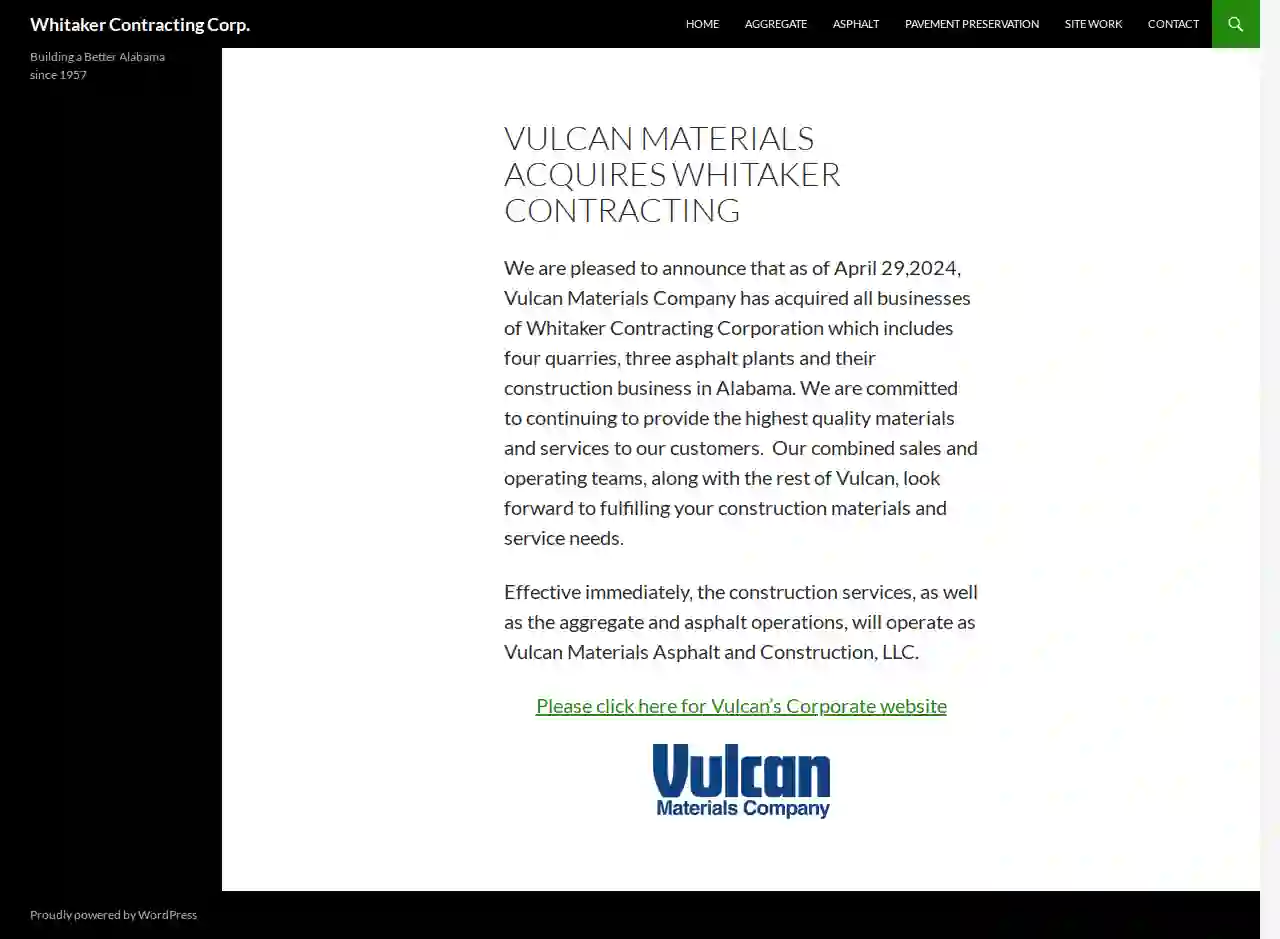
Whitaker Contracting
442 reviewsHuntsville, USWhitaker Contracting Corp. is a leading provider of construction materials and services in Alabama. We have been serving the state since 1957, and we are committed to providing the highest quality products and services to our customers. We are pleased to announce that as of April 29, 2024, Vulcan Materials Company has acquired all businesses of Whitaker Contracting Corporation which includes four quarries, three asphalt plants and their construction business in Alabama. We are committed to continuing to provide the highest quality materials and services to our customers. Our combined sales and operating teams, along with the rest of Vulcan, look forward to fulfilling your construction materials and service needs. Effective immediately, the construction services, as well as the aggregate and asphalt operations, will operate as Vulcan Materials Asphalt and Construction, LLC. Please click here for Vulcan’s Corporate website
- Services
- Why Us?
- Gallery
Get Quote
Prefabex USA
12501 Alexandria Road, Anniston, 36201, USExpert Modular Construction in the USA A practical, affordable and sustainable solution to housing and development Prefabex USA Discover excellence with the USA's leading modular home constructor. A leading prefab and mobile home builder delivering bespoke solutions. Pre-engineered Steel Buildings Prefabex USA is the industry-leading manufacturer of pre-Engineered steel and metal building solutions. With custom and turnkey buildings.
- Services
- Why Us?
- Gallery
Get Quote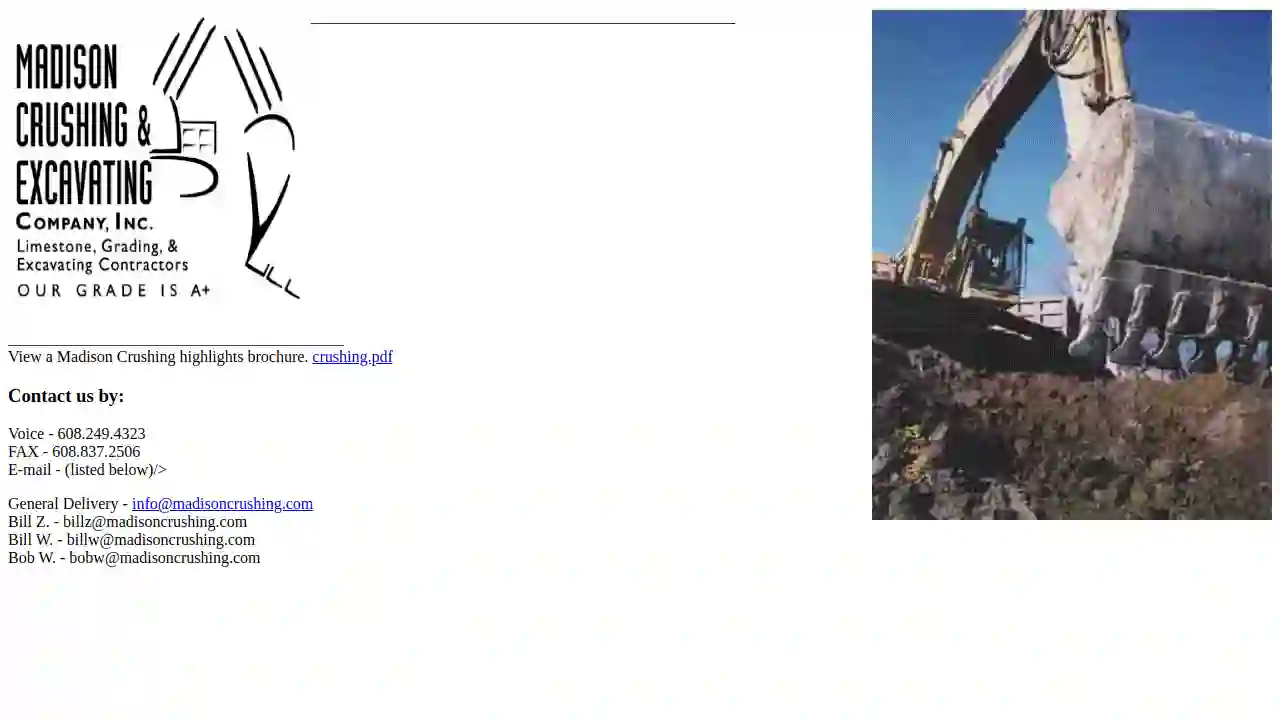
Madison Crushing & Excavating
3.76 reviewsMadison, USMadison Crushing Madison Crushing is a leading provider of crushing and recycling services in the Madison area. We are committed to providing our customers with the highest quality service and the most competitive prices. We have a team of experienced professionals who are dedicated to meeting your needs. We offer a wide range of services, including: Crushing Recycling Demolition Hauling We are also committed to environmental responsibility. We recycle as much material as possible and dispose of waste in an environmentally sound manner. We are proud to be a part of the Madison community and we are committed to providing our customers with the best possible service. We are a family-owned and operated business with over 20 years of experience in the crushing and recycling industry. We are committed to providing our customers with the highest quality service and the most competitive prices. We have a team of experienced professionals who are dedicated to meeting your needs. We offer a wide range of services, including crushing, recycling, demolition, and hauling. We are also committed to environmental responsibility. We recycle as much material as possible and dispose of waste in an environmentally sound manner. We are proud to be a part of the Madison community and we are committed to providing our customers with the best possible service.
- Services
- Why Us?
- Gallery
Get Quote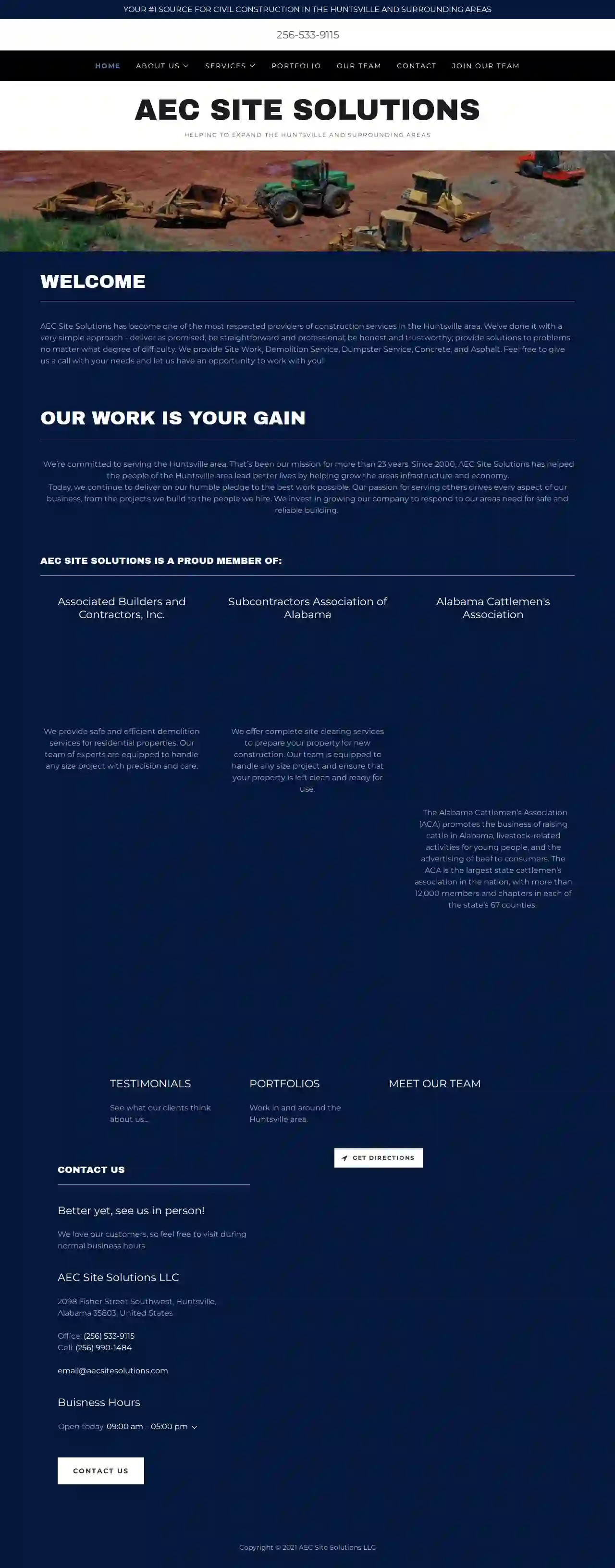
A E C Site Solutions
57 reviews2098 Fisher Street Southwest, Huntsville, USAEC Site Solutions: Your #1 Source for Civil Construction in Huntsville and Surrounding Areas AEC Site Solutions has earned a reputation as one of the most respected construction service providers in the Huntsville area. Our success stems from a simple yet effective approach: delivering on our promises, maintaining professionalism and transparency, and offering reliable solutions to any challenge. We specialize in Site Work, Demolition Service, Dumpster Service, Concrete, and Asphalt. Don't hesitate to contact us with your construction needs, and allow us the opportunity to collaborate with you. Our Work is Your Gain We are dedicated to serving the Huntsville community. This commitment has been our driving force for over 23 years. Since 2000, AEC Site Solutions has played a vital role in enhancing the lives of Huntsville residents by contributing to the growth of the area's infrastructure and economy. We remain steadfast in our pledge to deliver exceptional work. Our passion for serving others permeates every aspect of our business, from the projects we undertake to the talented individuals we employ. We invest in our company's growth to meet the region's demand for safe and reliable construction services. AEC Site Solutions is a Proud Member of: Associated Builders and Contractors, Inc. Subcontractors Association of Alabama Alabama Cattlemen's Association
- Services
- Why Us?
- Our Team
- Testimonials
- Gallery
Get Quote
Over 3,943+ Excavation Companies in our network
Our excavation pros operate in Birmingham & beyond!
ExcavationHQ has curated and vetted the Best Excavation Businesses in Birmingham. Find a reliable business today.
Frequently Asked Questions About Demolition Contractors
- Waste Generation: Demolition generates a large volume of debris, contributing to landfill space and potentially releasing harmful substances into the environment if not disposed of properly.
- Air Pollution: Dust and particulate matter released during demolition can impact air quality, affecting human health and the environment.
- Noise Pollution: Demolition activities can generate significant noise, disturbing nearby residents and wildlife.
- Resource Depletion: Demolition consumes resources that could be salvaged and reused, contributing to resource depletion and environmental degradation.
- Feasibility Studies: Assessing the viability and challenges of a demolition project.
- Demolition Planning: Developing demolition plans, including method selection, sequencing, and safety procedures.
- Permitting Assistance: Navigating the demolition permitting process and ensuring compliance with regulations.
- Hazardous Material Surveys: Identifying and managing hazardous materials, such as asbestos and lead paint.
- Cost Estimating: Providing accurate cost estimates for demolition services.
- Project Management: Overseeing the demolition process and ensuring it proceeds as planned.
- Recycling: Concrete, brick, metal, and wood can be recycled and reused in other construction projects, reducing waste sent to landfills.
- Landfill Disposal: Non-recyclable materials are disposed of in designated landfills according to local regulations.
- Donation: Some materials, such as fixtures or appliances, may be suitable for donation to charitable organizations.
What are the environmental impacts of demolition?
What is the difference between demolition and deconstruction?
Demolition: Typically involves bringing down a structure quickly and efficiently, often using heavy machinery and potentially explosives. The primary goal is to clear the site.
Deconstruction: Focuses on carefully dismantling a building piece by piece to salvage reusable materials. It prioritizes minimizing waste and environmental impact, often involving manual labor and specialized tools.
The choice between demolition and deconstruction depends on the project's objectives, budget, and environmental considerations.
What is the role of a demolition consultant?
What happens to the debris after demolition?
What are the environmental impacts of demolition?
- Waste Generation: Demolition generates a large volume of debris, contributing to landfill space and potentially releasing harmful substances into the environment if not disposed of properly.
- Air Pollution: Dust and particulate matter released during demolition can impact air quality, affecting human health and the environment.
- Noise Pollution: Demolition activities can generate significant noise, disturbing nearby residents and wildlife.
- Resource Depletion: Demolition consumes resources that could be salvaged and reused, contributing to resource depletion and environmental degradation.
What is the difference between demolition and deconstruction?
Demolition: Typically involves bringing down a structure quickly and efficiently, often using heavy machinery and potentially explosives. The primary goal is to clear the site.
Deconstruction: Focuses on carefully dismantling a building piece by piece to salvage reusable materials. It prioritizes minimizing waste and environmental impact, often involving manual labor and specialized tools.
The choice between demolition and deconstruction depends on the project's objectives, budget, and environmental considerations.
What is the role of a demolition consultant?
- Feasibility Studies: Assessing the viability and challenges of a demolition project.
- Demolition Planning: Developing demolition plans, including method selection, sequencing, and safety procedures.
- Permitting Assistance: Navigating the demolition permitting process and ensuring compliance with regulations.
- Hazardous Material Surveys: Identifying and managing hazardous materials, such as asbestos and lead paint.
- Cost Estimating: Providing accurate cost estimates for demolition services.
- Project Management: Overseeing the demolition process and ensuring it proceeds as planned.
What happens to the debris after demolition?
- Recycling: Concrete, brick, metal, and wood can be recycled and reused in other construction projects, reducing waste sent to landfills.
- Landfill Disposal: Non-recyclable materials are disposed of in designated landfills according to local regulations.
- Donation: Some materials, such as fixtures or appliances, may be suitable for donation to charitable organizations.